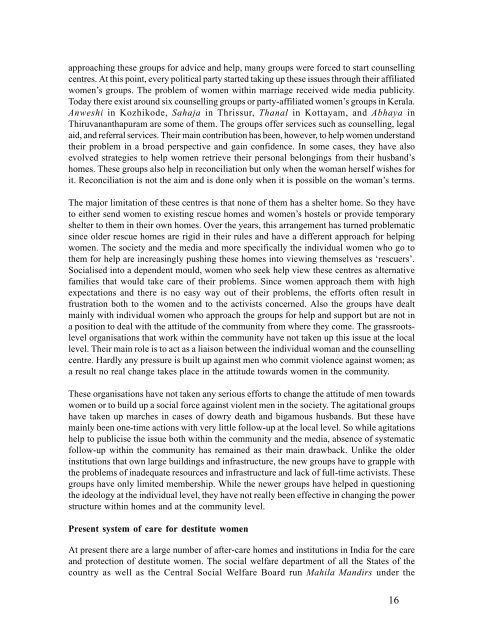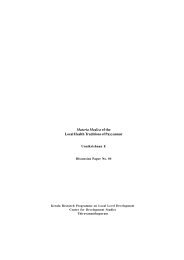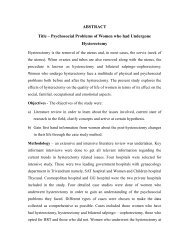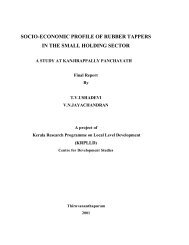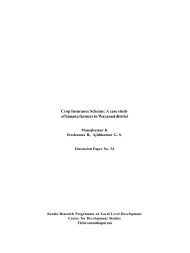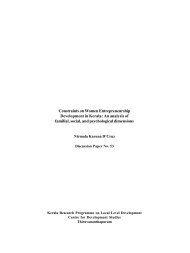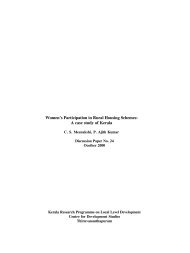Destitute Women in Kerala: Psychological resources and psycho ...
Destitute Women in Kerala: Psychological resources and psycho ...
Destitute Women in Kerala: Psychological resources and psycho ...
You also want an ePaper? Increase the reach of your titles
YUMPU automatically turns print PDFs into web optimized ePapers that Google loves.
approach<strong>in</strong>g these groups for advice <strong>and</strong> help, many groups were forced to start counsell<strong>in</strong>g<br />
centres. At this po<strong>in</strong>t, every political party started tak<strong>in</strong>g up these issues through their affiliated<br />
women’s groups. The problem of women with<strong>in</strong> marriage received wide media publicity.<br />
Today there exist around six counsell<strong>in</strong>g groups or party-affiliated women’s groups <strong>in</strong> <strong>Kerala</strong>.<br />
Anweshi <strong>in</strong> Kozhikode, Sahaja <strong>in</strong> Thrissur, Thanal <strong>in</strong> Kottayam, <strong>and</strong> Abhaya <strong>in</strong><br />
Thiruvananthapuram are some of them. The groups offer services such as counsell<strong>in</strong>g, legal<br />
aid, <strong>and</strong> referral services. Their ma<strong>in</strong> contribution has been, however, to help women underst<strong>and</strong><br />
their problem <strong>in</strong> a broad perspective <strong>and</strong> ga<strong>in</strong> confidence. In some cases, they have also<br />
evolved strategies to help women retrieve their personal belong<strong>in</strong>gs from their husb<strong>and</strong>’s<br />
homes. These groups also help <strong>in</strong> reconciliation but only when the woman herself wishes for<br />
it. Reconciliation is not the aim <strong>and</strong> is done only when it is possible on the woman’s terms.<br />
The major limitation of these centres is that none of them has a shelter home. So they have<br />
to either send women to exist<strong>in</strong>g rescue homes <strong>and</strong> women’s hostels or provide temporary<br />
shelter to them <strong>in</strong> their own homes. Over the years, this arrangement has turned problematic<br />
s<strong>in</strong>ce older rescue homes are rigid <strong>in</strong> their rules <strong>and</strong> have a different approach for help<strong>in</strong>g<br />
women. The society <strong>and</strong> the media <strong>and</strong> more specifically the <strong>in</strong>dividual women who go to<br />
them for help are <strong>in</strong>creas<strong>in</strong>gly push<strong>in</strong>g these homes <strong>in</strong>to view<strong>in</strong>g themselves as ‘rescuers’.<br />
Socialised <strong>in</strong>to a dependent mould, women who seek help view these centres as alternative<br />
families that would take care of their problems. S<strong>in</strong>ce women approach them with high<br />
expectations <strong>and</strong> there is no easy way out of their problems, the efforts often result <strong>in</strong><br />
frustration both to the women <strong>and</strong> to the activists concerned. Also the groups have dealt<br />
ma<strong>in</strong>ly with <strong>in</strong>dividual women who approach the groups for help <strong>and</strong> support but are not <strong>in</strong><br />
a position to deal with the attitude of the community from where they come. The grassrootslevel<br />
organisations that work with<strong>in</strong> the community have not taken up this issue at the local<br />
level. Their ma<strong>in</strong> role is to act as a liaison between the <strong>in</strong>dividual woman <strong>and</strong> the counsell<strong>in</strong>g<br />
centre. Hardly any pressure is built up aga<strong>in</strong>st men who commit violence aga<strong>in</strong>st women; as<br />
a result no real change takes place <strong>in</strong> the attitude towards women <strong>in</strong> the community.<br />
These organisations have not taken any serious efforts to change the attitude of men towards<br />
women or to build up a social force aga<strong>in</strong>st violent men <strong>in</strong> the society. The agitational groups<br />
have taken up marches <strong>in</strong> cases of dowry death <strong>and</strong> bigamous husb<strong>and</strong>s. But these have<br />
ma<strong>in</strong>ly been one-time actions with very little follow-up at the local level. So while agitations<br />
help to publicise the issue both with<strong>in</strong> the community <strong>and</strong> the media, absence of systematic<br />
follow-up with<strong>in</strong> the community has rema<strong>in</strong>ed as their ma<strong>in</strong> drawback. Unlike the older<br />
<strong>in</strong>stitutions that own large build<strong>in</strong>gs <strong>and</strong> <strong>in</strong>frastructure, the new groups have to grapple with<br />
the problems of <strong>in</strong>adequate <strong>resources</strong> <strong>and</strong> <strong>in</strong>frastructure <strong>and</strong> lack of full-time activists. These<br />
groups have only limited membership. While the newer groups have helped <strong>in</strong> question<strong>in</strong>g<br />
the ideology at the <strong>in</strong>dividual level, they have not really been effective <strong>in</strong> chang<strong>in</strong>g the power<br />
structure with<strong>in</strong> homes <strong>and</strong> at the community level.<br />
Present system of care for destitute women<br />
At present there are a large number of after-care homes <strong>and</strong> <strong>in</strong>stitutions <strong>in</strong> India for the care<br />
<strong>and</strong> protection of destitute women. The social welfare department of all the States of the<br />
country as well as the Central Social Welfare Board run Mahila M<strong>and</strong>irs under the<br />
16


